A sea of fuschia and pastel girl boss suits eagerly filed into a warehouse venue in Brooklyn on an early Friday morning for a jam-packed agenda at the 2023 Vegan Women Summit (VWS).
On May 19th, attendees fueled up on Impossible sausage stuffed breakfast burritos for a weekend-long marathon of panels, networking and taste testing. The three-day experience kicked off the night before at Gracie Mansion for a VIP Welcome Reception with one of New York City’s most talked about vegans, Mayor Eric Adams.
Jennifer Stojkovic, a Silicon Valley tech vet with Google, Facebook and the book “The Future of Food is Female” on her resume, launched the VWS in 2020 virtually due to the pandemic. She hosted its inaugural in-person event in Los Angeles in 2022 — featuring entrepreneurs, aspiring business owners, activists and tastemakers from around the world who are invested in building a more equitable and diverse representation of women leaders.
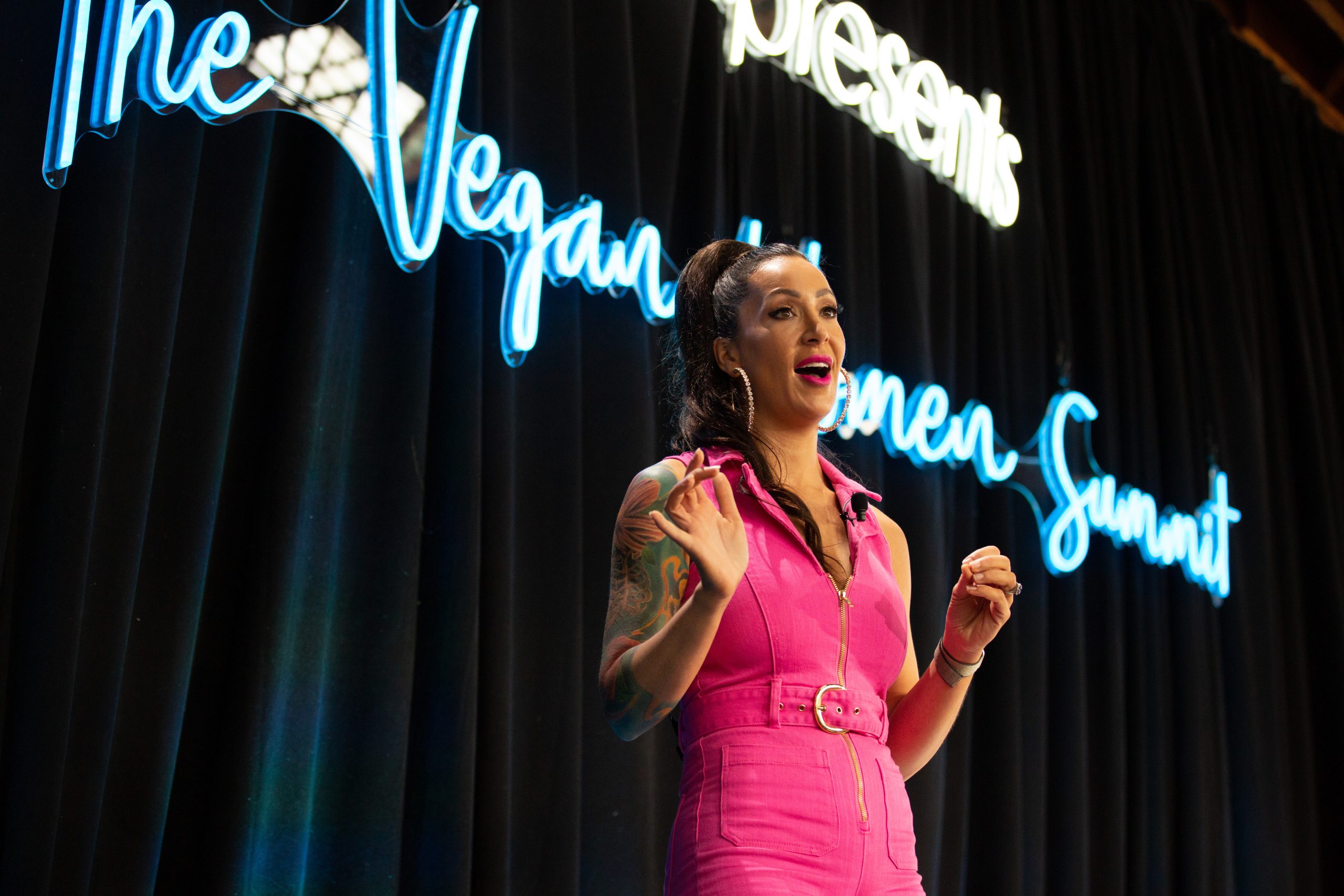
Jennifer Stojkovic speaking to the audience at the Vegan Women Summit. May 19 2023.
Stojkovic founded the VWS after noticing the untapped potential of women, specifically women of color, in the food tech space. Black and brown communities are the leading group turning towards plant-based and vegan diets. A Gallop poll conducted in 2021 found that 31% of nonwhite respondents cut back on their meat consumption within the year prior compared to 19% of white respondents. Black and Latinx people –– a demographic disproportionately impacted by heart disease and diabetes, who lacks equal access to preventive and quality health care –– are motivated to consume less meat in an attempt to improve their health, but it’s not always an option in communities rife with food insecurity. The leaders who attended VWS are fighting against the notion that the benefits of a plant-based lifestyle should be a last resort, or are only attainable if you’re affluent and white.
Black and Latinx leaders were front and center at the East Coast edition of the VWS where over 1,100 guests rallied around the sold-out summit’s theme to build community and compassionate movement building.
The VWS buzzed with excitement for a diverse group of 100 speakers and panelists –– over 80% of whom were women of color –– in conversations from “How To Build an Inclusive Plant-Based Brand” to “Is Food as Medicine the Solution to the Healthcare Crisis?” Cleveland-based Chef Sonia Steele of Konscious Kuisine took home the prize in a Top Chef-inspired challenge where vegan chefs went head to head for a panel of high-profile judges including CEOs from mock meat brands Tindle and Impossible. Attendees indulged in the festival’s samples and catering as they rubbed elbows with superstar vegan influencers like celebrity chef Priyanka Naik; author Joanne Lee Molinaro, known as The Korean Vegan; and YouTuber Radhi Devlukia-Shetty. DJ Amor bumped Bad Bunny while kombucha flowed in the food truck courtyard where Mr. Charlie’s served up “chicken” Tindle nuggets out of McDonald’s “frowny meal” boxes. Tokyo-based artist Mamimozi also painted live calligraphy.
Women of color are actively changing the narrative about veganism within their communities by debunking common misconceptions, fostering inclusivity, promoting accessibility, fighting injustices, investing in future generations and calling for more capital.
We gathered some of the main takeaways from Black and Latinx speakers and leaders at VSW on the state of the plant-based movement in communities of color, and the changes they’d like to see.
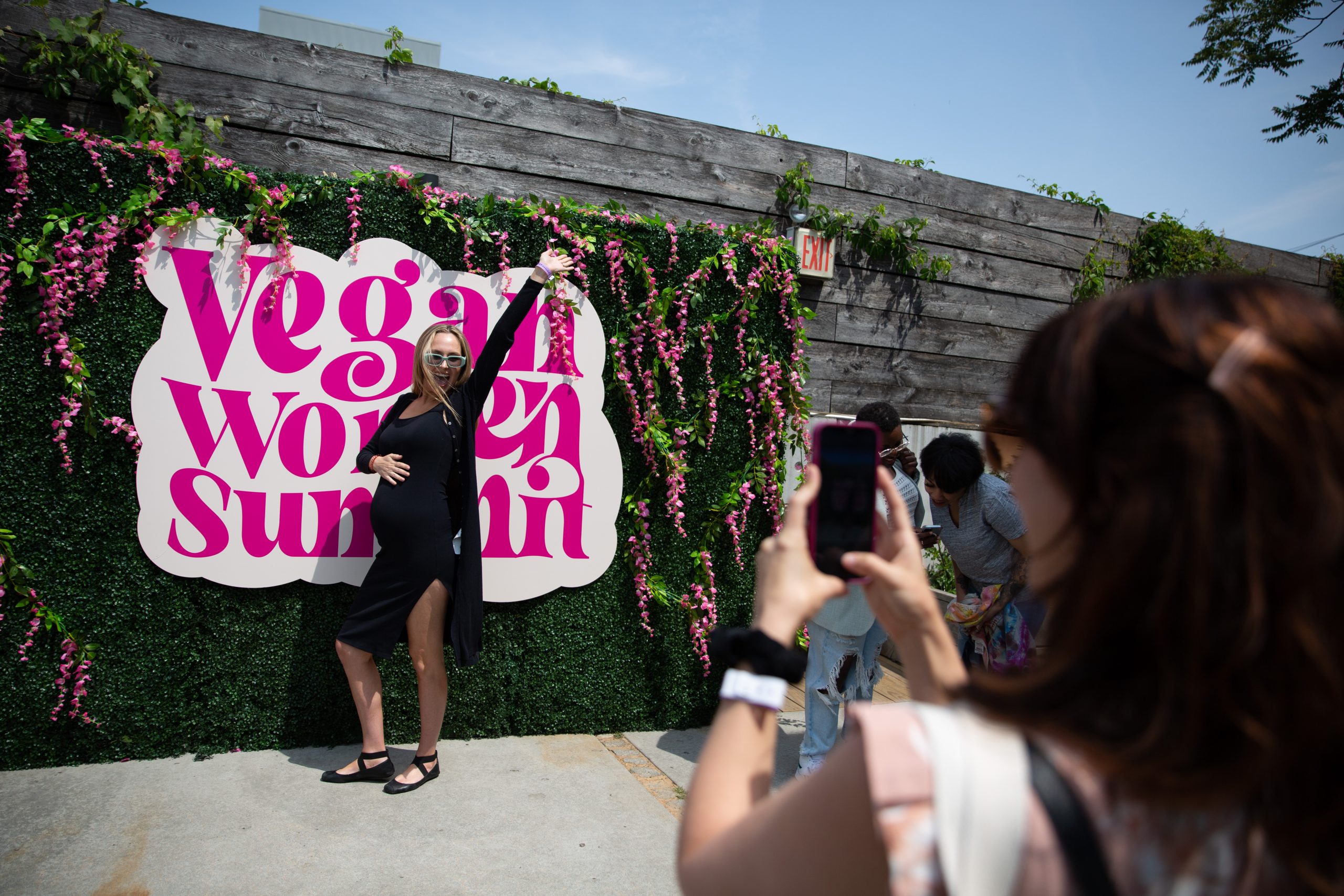
Attendee strikes a pose for a photographer in front of The Vegan Women Summit flowered living wall. Image by Vegan Women Summit.
Veganism Doesn’t Have to Come at the Cost of Culture
Going vegan or vegetarian can sometimes feel like a cultural sacrifice.
Author and Chef Dora Stone, a participant in the VWS’s Top Chef competition, has received pushback online for the vegan adaptations of Mexican classics she posts on her blog Dora’s Table. While Stone uses her platform to show her community that a vegan diet doesn’t have to break the bank or traditions, she’s still been accused of trying to change how Mexican Americans eat.
“[The Mexican community feels] very protective of it, and I understand,” Stone said. “I do receive a lot of messages from people saying that they thought that when they chose veganism, they were rejecting their culture. They thought they were never gonna be able to have their abuelita’s pozole, which is not true.”
While spending time in Oaxaca recently to work on her first cookbook, Stone learned about meatless recipes passed down for generations. Easy substitutes and simple meals can make plant-based dishes more accessible, without pricey alternatives. For example, enchiladas can be made with vegetables instead of animal protein and walnut “meat” works well as a sope topping, Stone explained.
“We could go back to our roots and focus on the food that we know already,” she said. “You could still have the flavor, you could still honor the tradition and you could still share that in the community.”
Gender Stigma Gives Veganism a Bad Rap
When food is also deeply ingrained in identity, the idea of changing diets can be perceived as a threat to someone’s sense of self.
Leah Garces, CEO and president of the animal protection organization Mercy for Animals, has seen a direct link between toxic masculinity and high meat consumption.
“There is an unfortunate misconception in our community that you need to eat meat to be healthy, and even worse for our men, that it’s like a machismo thing to eat meat,” Garces told LATINA. “It couldn’t be further from the truth.”
Gender stigma can also perpetuate harmful misinformation about plant-based products. Deborah Torres, the founder behind the Shark Tank-winning meat alternative brand Atlas Monroe, a VWS sponsor, has seen it firsthand.
“The myth about soy is that it has estrogen that causes men to have breasts or something,” Torres told LATINA. “Like, are you joking?”
Such myths might be responsible for men accounting for just 24% of vegans in the US. More representation of marginalized communities within the plant-based space can help mitigate barriers to entry, according to Garces.
“There’s a misconception that vegan food is unattainable for low-income people,” she said. “That’s why we need more faces, people of color, people from our communities showing another way.”
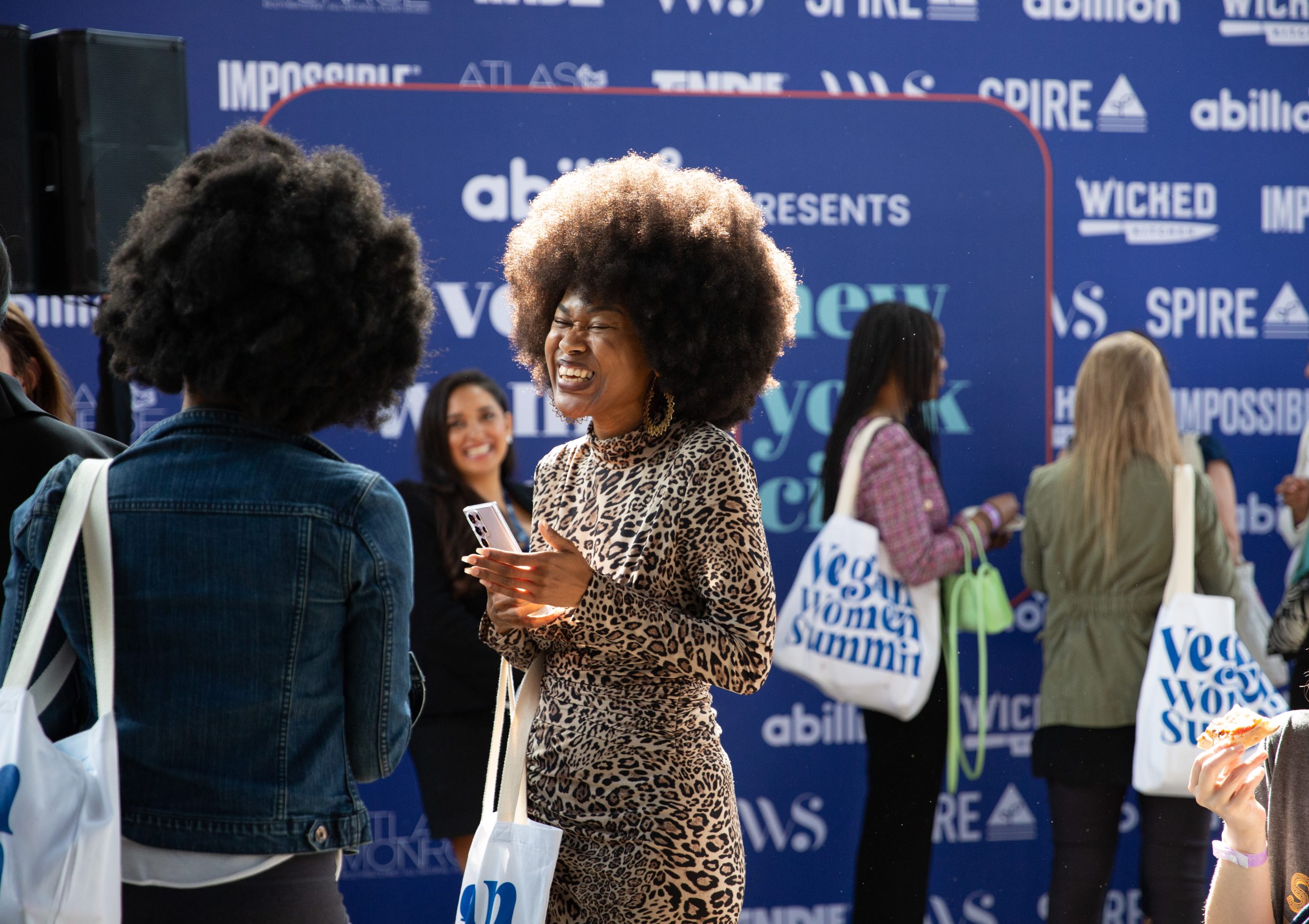
Attendees laughing and enjoying conversations as they mingle during The Vegan Women Summit. Image by Vegan Women Summit.
The Animal Rights and Human Rights Movements are Inextricably Linked
Supporting the animal welfare movement presents an opportunity to promote racial justice.
Meatpackers — who are forced to work in unsafe conditions for low wages — are disproportionately people of color and immigrants — 44% are Latino and 25% are Black, according to an analysis by the Center for Economic and Policy Research.
Mass food production, even if plant-based, is not exempt from unethical labor practices, but Garces explained that slaughterhouses in particular are driving the exploitation and abuse of Latin American immigrants, including children.
“They are folks that are kept in intentionally vulnerable situations with low political power, because if they could vote, they could change the system, and they could change the way that they’re treated,” she said. “There is a real need to stand up and protect our communities, and how they are being abused in our food system.”
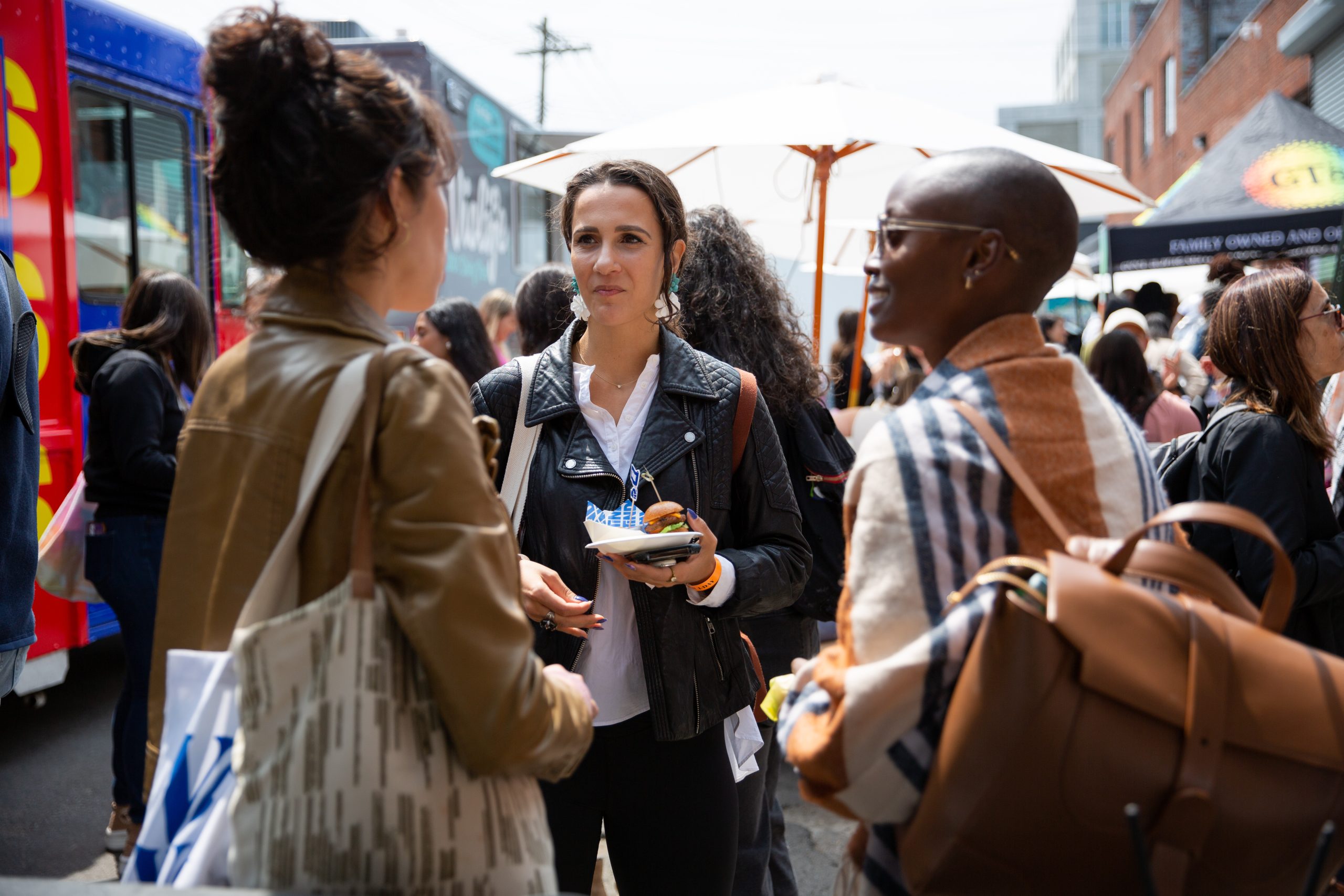
Attendees at The Vegan Women Summit enjoying conversations in Food Truck Alley during lunch. Attendee in center is holding a TiNDLE slider. Image by Vegan Women Summit.
Being a Woman of Color in Food Tech Can Be an Advantage
While food tech isn’t an exception to the predominantly male and white-dominated startup world, Veronica Garcia-Arteaga, who is behind the convincing jiggly faux egg brand Neggst, said her Mexican identity has given her confidence as an entrepreneur.
Garcia-Arteaga launched the plant-based egg brand in Berlin in 2022. Intimated at first, she didn’t let her limited German language skills stop her from pitching the brand.
“It’s a barrier to be a Latina somewhere else that is not my country,” she told Latina. “But there’s nobody else that works harder than us. You are an immigrant and then you have made your way through it. Every time I meet another Latino or an immigrant in Europe making their own company, it’s inspiring to hear the stories.”
Room for Latinx food-tech leaders is opening up, she said, “We were kind of competing against each other, but now I feel like we are really creating a larger community, a supportive one.”
Investing in the Youth Can Build a More Sustainable Future
Giving back to the Latinx community is key for Yesenia Ramdass who is behind the Queens Trinidadian and Dominican restaurant Healthy As a Motha, where she’s made a conscious effort to employ young people of color.
Ramdass remembers struggling to find a job as a teenager because she didn’t have experience, so she enjoys the challenge of fostering young talent. Younger generations — who are more educated on animal welfare, climate change and health issues — are more likely to adopt a plant-based diet than their boomer parents, and even millennial peers.
“The time is now to really target these young minds to think differently, to have an entrepreneurial mindset, to be passionate, to live with purpose,” Ramdass told Latina.
Growing up, Ramdass remembers living off of fast food chains like KFC, McDonald’s and Burger King in Washington Heights, New York’s predominately Dominican neighborhood.
“It was the right price, and you think with your budget, not really your mind,” she said. “It’s no coincidence that when you go uptown you see all these fast food joints, and then when you go to lower Manhattan there’s a Whole Foods and Trader Joe’s.”

A still of the audience at The Vegan Women Summit, listening intently to a panel on stage. Image by Vegan Women Summit.
Corporations Target Black and Brown Communities With Unhealthy Food
Low-income neighborhoods in New York City aren’t the only places in the US where junk food is easier to come by than farmer’s markets. People of color across the country are more likely to be victims of food apartheid with limited access to fresh fruits and vegetables. In majority-Black neighborhoods, convenience stores are more common than supermarkets, and 1 in 5 Black households in the US lives in a food desert. What’s more, 15% of Latinx people in the US live in lower-income areas where supermarkets are few and far between.
During the conversation “Why Black Women are the Most Powerful Vegan Consumer,” actress and activist Persia White recalled a childhood in the Bahamas where economic status didn’t determine what her family could and couldn’t eat.
White, a vegan champion before it was trendy, told LATINA she was almost fired from her role on the hit show ”Girlfriends” for supporting an anti-fur campaign. Now the co-producer of the 2005 animal rights documentary “Earthlings” is empowering Black people to reconnect with the plant foods from their heritage.
“We come from places with beans and legumes and then you come to America where it’s fast food and the culture shifts,” White said. When processed foods are sold as cultural staples, traditions are lost, she explained.
“That’s new influence from corporations that want to earn our dollars. We’ve been literally fed a type of food that a lot of the corporations that put it in our neighborhood aren’t consuming themselves,” White said.
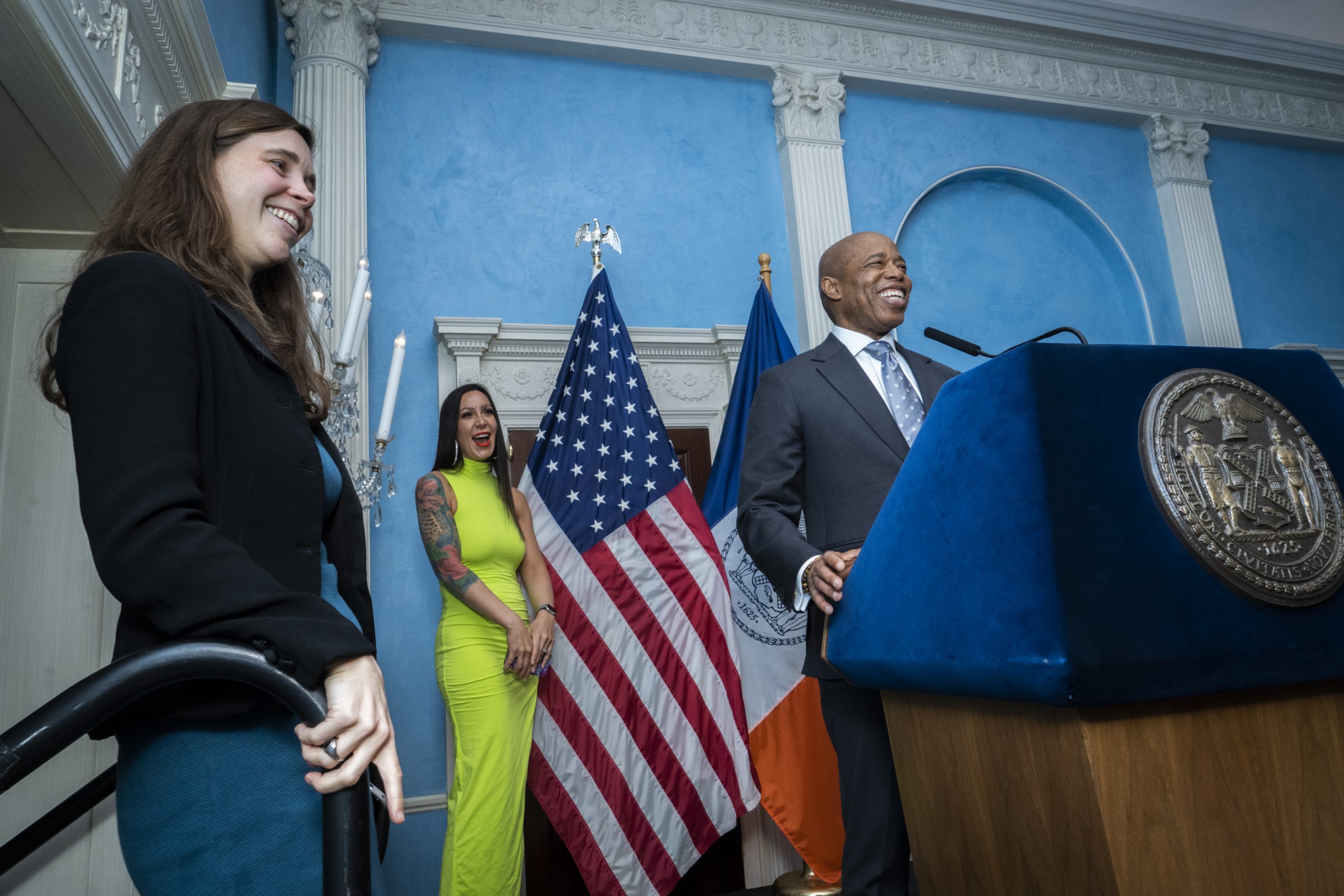
(Left to right) Rachel Atcheson of Office of the Mayor of New York City, Jennifer Stojkovic of Vegan Women Summit, and New York City Mayor Eric Adams at Gracie Mansion for The Vegan Women Summit VIP Reception. Image by Vegan Women Summit.
Diverse Businesses Need Funding
As the plant-based market becomes oversaturated with processed food products, Isabella Iglesias-Musachio, founder of the mycelium filets and cutlets brand Bosque Foods, sees room for more diverse and healthier food options. Iglesias-Musachio thinks founders and leaders of color can lead the charge if they’re enabled to build their own food businesses.
“Everyone loves burgers, everyone loves chicken wings, chicken nuggets,” Iglesias-Musachio told LATINA.
“They’re very good products. It’s done, right? We don’t need more of that. We need more unique products that are actually representing different types of foods, different types of cuisines from around the world.”
Empowering chefs and entrepreneurs with unique lived experiences and perspectives to lead the plant-based movement requires investment through funding, Iglesias-Musachio explained.
While the number of Latino business owners grew 34% from 2007 to 2019, funding for women and people of color declined in 2020. But only 2% of women receive venture capital funding with .64% for Latina founders and .41% for Black founders.
“It’s enabling people who might not typically think of themselves or think that they can actually build those businesses to do that,” Iglesias-Musachio said. “A lot of it comes down to giving people a platform, giving people an opportunity, and then backing them with financial support.”
Leah Rodriguez is a writer living in New York City covering food, culture and women’s rights.









